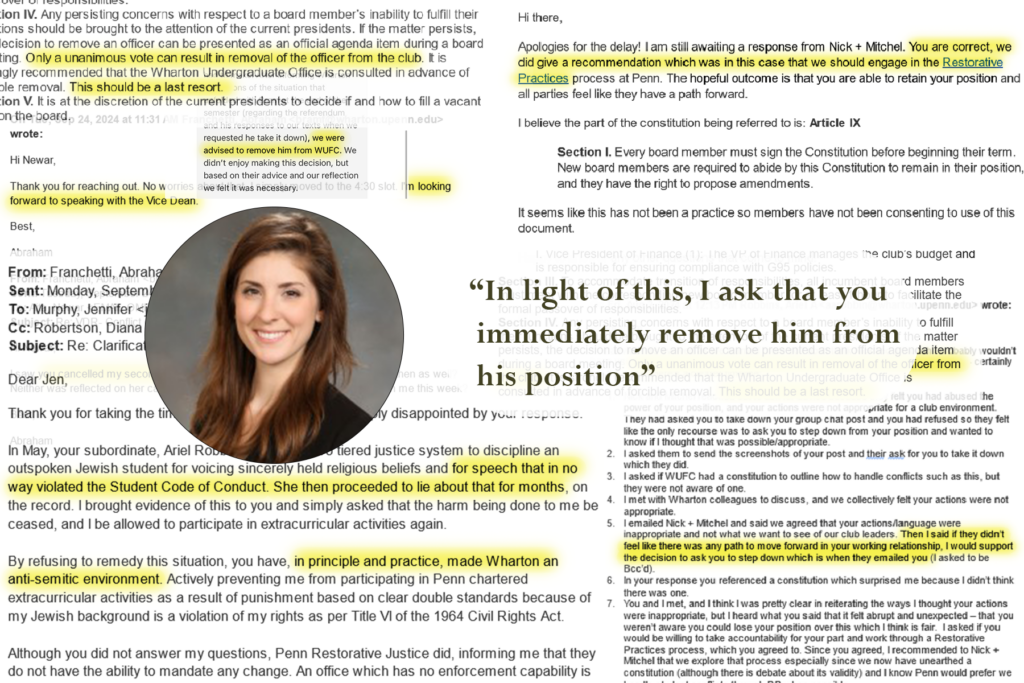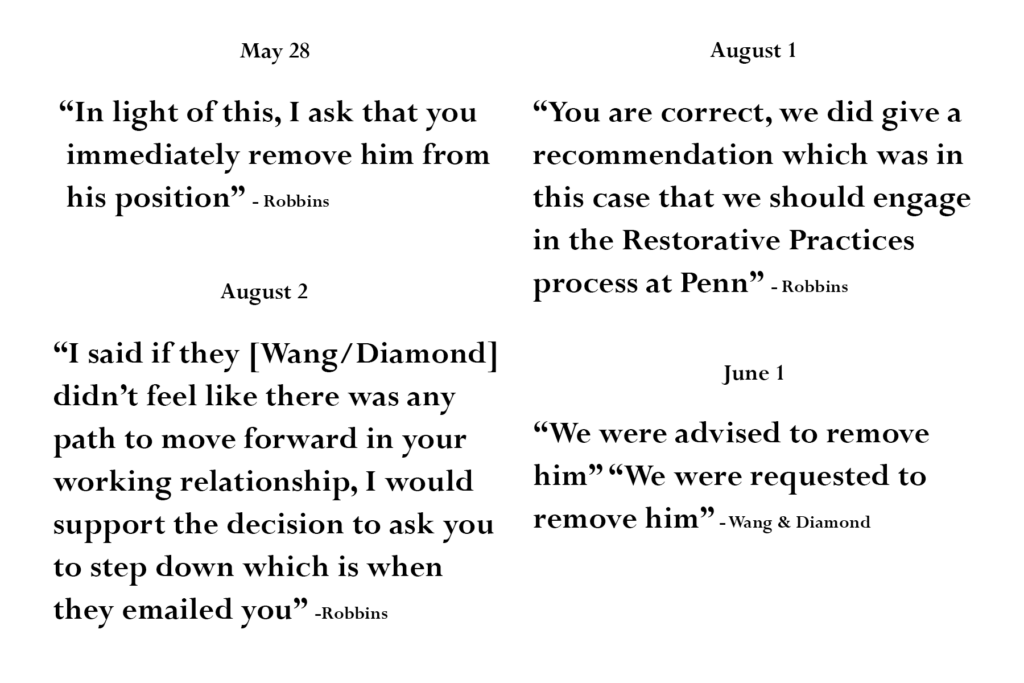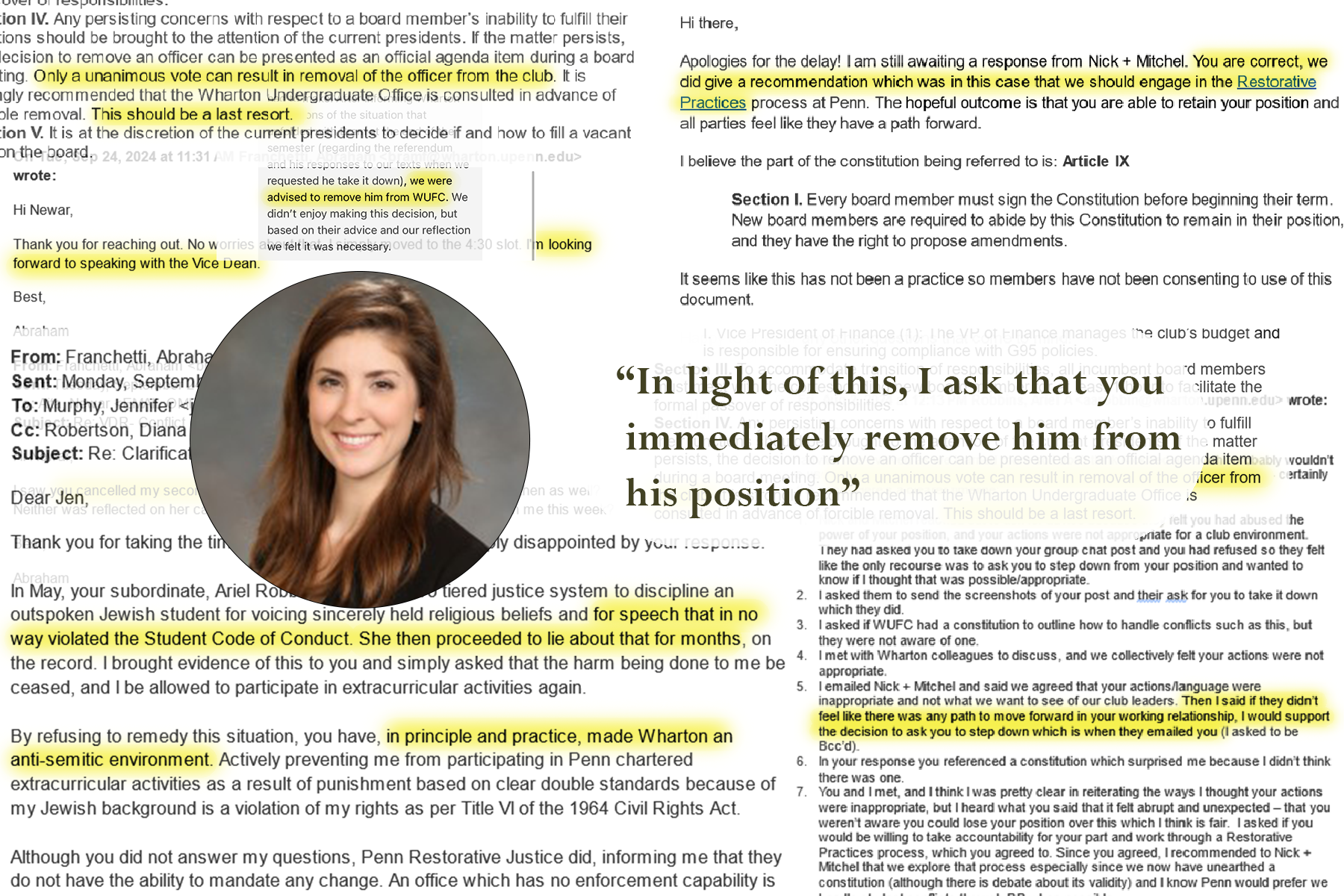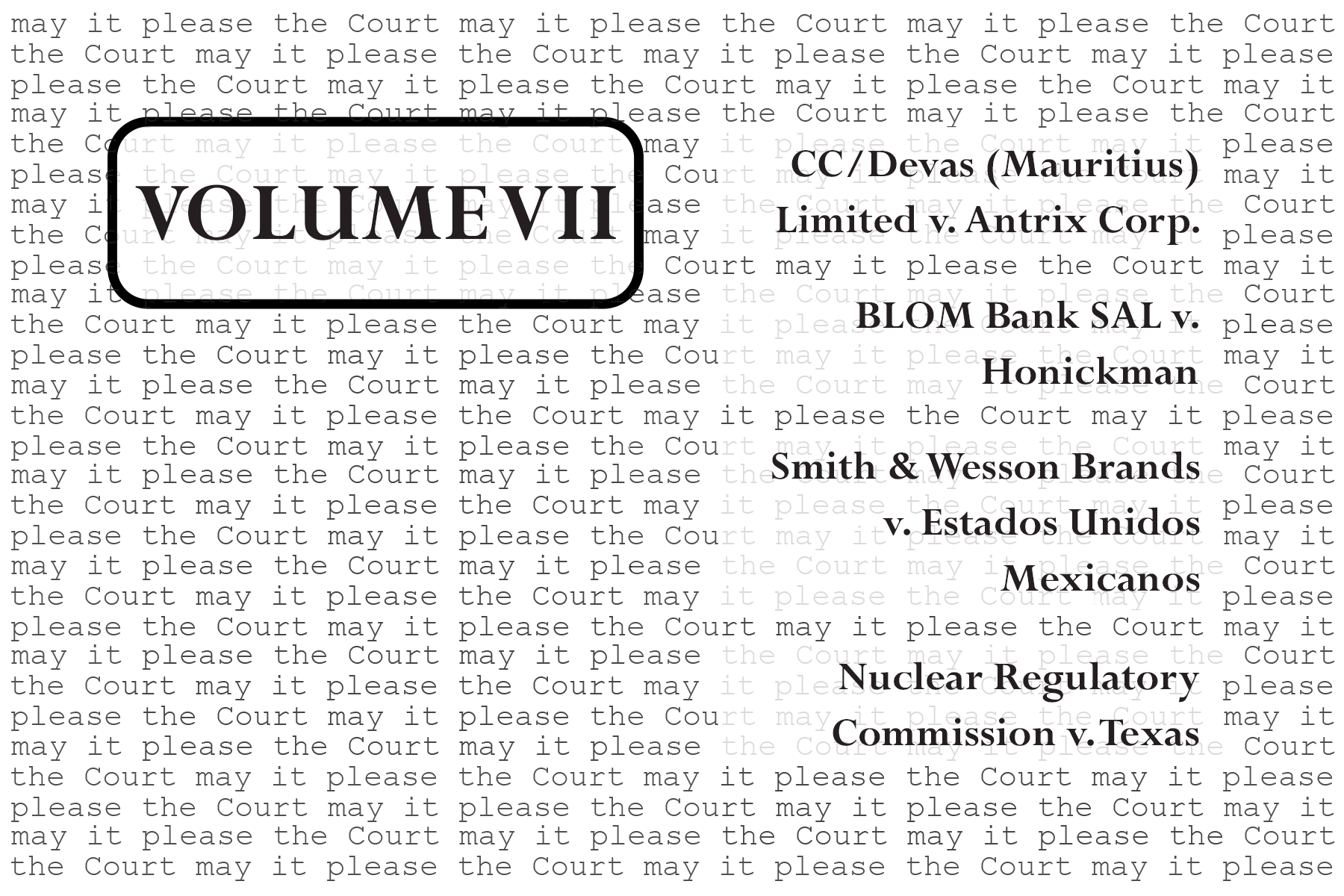“Robbins’ promotion is a slap in the face to all students and alumni who care about fairness, tolerance, and honesty,” Franchetti said.

Photo Credit: Sarah Mester
By Sarah Mester
Wharton junior Abraham Franchetti was suspended from his board position in the prestigious Wharton Undergraduate Finance Club (WUFC) this June. His removal came at the request of Wharton administrator Ariel Robbins after a short anti-Communist political joke sparked backlash from WUFC’s Co-Presidents. Franchetti was removed from his position as Vice President of the Investment Team without any official process and was misled, according to Franchetti, by Ariel Robbins, who was the Associate Director of Professional Readiness at the time, about what disciplinary recommendation was made regarding his case. Robbins was soon after promoted to Director of Student and Alumni Engagement.
Ariel Robbins has not responded to the Pennsylvania Post’s request for comment.
Franchetti, who was eventually reinstated to his position, has been a member of WUFC since his freshman fall and was the club’s treasurer during his freshman spring and sophomore fall, during which he was deeply involved in the operation of the club. Franchetti and Robbins had previously had a friendly relationship, with Robbins inviting Franchetti to a summit on Wharton club policies in the spring of 2024.
Sophomore Evan Canis, a WUFC Investment Team member noted that “From the moment I joined WUFC last year, it was abundantly clear that Abraham had a considerable depth and breadth of knowledge that he was passionate about sharing with younger students. Beyond being a great teacher of financial concepts, he has been supportive of member success outside of the classroom, being a great and honest source for advice and feedback. It goes without saying that Abraham has been a considerable value-add to my experience in WUFC and at Penn more generally.”
Franchetti’s original comment was short and sent to a small, internal WUFC group chat on May 1, 2024: “Hey yall remember to vote no on the undergrad divestment referendum: the commies want to stop us from getting superior risk adjusted returns.” Franchetti then attached a link to the voting page for the referendum, which was focused on whether or not the University of Pennsylvania should divest from Israel and disclose the endowment fund’s investments. At the time, the Israel-Palestine issue was at the forefront of campus conversation and the Gaza Solidarity Encampment had been established the week before.

Co-Presidents of WUFC Mitchel Wang and Nicholas Diamond requested that Franchetti take down the first part of the message and leave the link. He refused, saying that he had “every right to share an opinion” and that he “not sure” why what he said was a problem, since in his view the financial theme of the comment was appropriate for the chat, where financial and economic policy were often discussed. He offered to add a disclaimer to his message to make it clear that it was not endorsed by WUFC, but Wang told him not to post such a message.
Franchetti reported that no other WUFC member expressed discomfort with the message to his knowledge. He did not hear more about the incident until June 2, when Wang and Diamond removed him from his position as Vice President of the Investment Team. In a message to the WUFC Board chat, Diamond reported that he had spoken to Wharton Operations and that they “were requested to remove him”. In a private message to Franchetti, Wang and Diamond said that they “were advised to remove him”. “The lack of due process or warning to myself or the broader WUFC board highlights just how wrong this decision was,” Franchetti said.
Prior to his removal, Franchetti had not been informed of any disciplinary procedures brought against him by either Wharton or WUFC and he reported that the removal came as a “complete surprise”. Franchetti argues that for the WUFC to remove him, they need to follow the procedure outlined in Article III Section IV of the WUFC constitution, which requires a unanimous vote by the board to remove a member. A newer, revised version of the constitution was found in the WUFC archives, but the removal procedure is identical. It is not clear if the current board was aware of either document and there was disagreement over whether either one was active. Franchetti argues that since every active club must have an active constitution and both existing constitutions had identical removal procedures, those were the proper procedures to follow.
Franchetti reached out to Robbins, who oversaw Wharton clubs, on June 25 for the first time since his removal seeking advice on how to remedy the situation, starting an email exchange
that spanned the summer. Franchetti spoke to Robbins on June 28 over the phone. Franchetti reported that he was told that while he had not broken any written rule, he had “violated the spirit of the code of conduct” and that using the word “commie” was discriminatory. Franchetti also recalled asking Robbins, “do we at Wharton not believe that communism is bad?” and that she laughed and said she did not know and that Wharton as an institution did not have a stance on the issue. He also recalled Robbins noting that his comment could have offended communist members of the Wharton Undergraduate Finance Club. Franchetti says that the call ended with Robbins offering to explore reinstating Franchetti.
In an email following up on August 1, Franchetti asked whether a disciplinary recommendation was made in his case and, if so, what it was. Robbins gave the following answer: “You are correct, we did give a recommendation which was in this case that we should engage in the Restorative Practices process at Penn. The hopeful outcome is that you are able to retain your position and all parties feel like they have a path forward.” Robbins detailed the timeline of her decision in a subsequent email and asserted that she had “met with Wharton colleagues to discuss, and we collectively felt your actions were not appropriate” and that only if Wang and Diamond “didn’t feel like there was any path to move forward in your working relationship” would she “support the decision to ask you to step down”.
Franchetti, however, was initially told that his removal had been “requested”. In late August, Franchetti gained access to an email between Robbins and Wang that took place on May 28—a couple of days before he was removed. The message indicated that Robbins and Wang spoke about the matter on the phone and that after learning more about the situation, Robbins decided that the best solution was for Franchetti to be removed, saying “I ask that you immediately remove him [Franchetti] from his position”. Restorative Practices were not mentioned and Robbins acknowledged in the email that she had “checked the University Student Conduct policy and they do not explicitly include derogatory slang about political affiliation”.

After failing to reach a solution, Franchetti requested that Robbins connect him with Wharton Undergraduate Executive Director Jennifer Murphy on August 30, which she did. Franchetti and the Executive Director met on September 11, during which Franchetti presented documentation to argue that he had been lied to about how his removal was handled.
“I hoped that by bringing this to light Wharton administration would take action and allow me to participate as a normal student again” Franchetti said. Murphy subsequently referred Franchetti to Restorative Practices to resolve the issue—a process that Franchetti was told would take at least two weeks, which would have excluded from WUFC for the start of the semester. Franchetti pointed out in a subsequent email to Murphy that Restorative Practices does not have any enforcement power, although there is no indication that a resolution achieved through the office would not have been respected.
Concerned about the timeline and the lack of movement towards reinstatement, Franchetti scheduled a meeting with the Vice Dean of the Undergraduate Division Diana Robertson and shared this message with Murphy and Roberston:
“In May, your subordinate, Ariel Robbins created a two tiered justice system to discipline an outspoken Jewish student for voicing sincerely held religious beliefs and for speech that in no way violated the Student Code of Conduct,” Franchetti wrote. “She then proceeded to lie about that for months, on the record. I brought evidence of this to you and simply asked that the harm being done to me be ceased, and I be allowed to participate in extracurricular activities again. By refusing to remedy this situation, you have, in principle and practice, made Wharton an anti-semitic environment. Actively preventing me from participating in Penn chartered extracurricular activities as a result of punishment based on clear double standards because of my Jewish background is a violation of my rights as per Title VI of the 1964 Civil Rights Act.”
No meeting ever took place. The Vice Dean’s assistant reached out to cancel two separately scheduled meetings and no additional meeting was scheduled during subsequent back and forth during the week of September 23.
“Vice Dean Robertson’s refusal to meet meant that without outside pressure, she was prepared to let discrimination by her subordinates stand,” Franchetti said. As a result, he reached out to the Executive Director at Penn Hillel Rabbi Greenberg for help resolving the matter.
On September 26, Franchetti received an email from Murphy noting that after “careful review and consideration of all materials, we have determined that the ambiguities of the constitution and the process for removal needs clarification” and that Franchetti should be reinstated while WUFC’s internal arbitration process can “unfold appropriately.”
Murphy also reiterated that “student-run organizations, including WUFC, are expected to uphold the University of Pennsylvania’s Nondiscrimination Statement.” Following his reinstatement, Franchetti reported that his relationship with Wang and Diamond has been distant, but that he has been able to participate fully in club activities.
Shortly after Franchetti’s reinstatement, Robbins updated her LinkedIn to announce her promotion to “Director of Student and Alumni Engagement.” On December 6th, she emailed Wharton club presidents to inform them that Isabelle Glass would be taking over as Assistant Director of Student Engagement.
“Robbins’ promotion is a slap in the face to all students and alumni who care about fairness, tolerance, and honesty,” Franchetti said to the Pennsylvania Post. He asserted that “Administrators should be held to a higher standard than students, not rewarded for lies.” Franchetti went on to argue that Wharton had promoted “an administrator who they know has lied and created double standards to target a pro-Israel and anti-Communist Jewish student.”
Ariel Robbins, Mitchel Wang, Nicholas Diamond, Jennifer Murphy, and Diana Robertson did not respond to a request to comment. Rabbi Greenberg declined to comment. Abraham Franchetti is Business Manager at the Pennsylvania Post.
Sarah Mester is a senior in the College studying Political Science and Classics from San Francisco, CA. She’s the Assistant News Editor for The Pennsylvania Post. Her email is smester@sas.upenn.edu.




